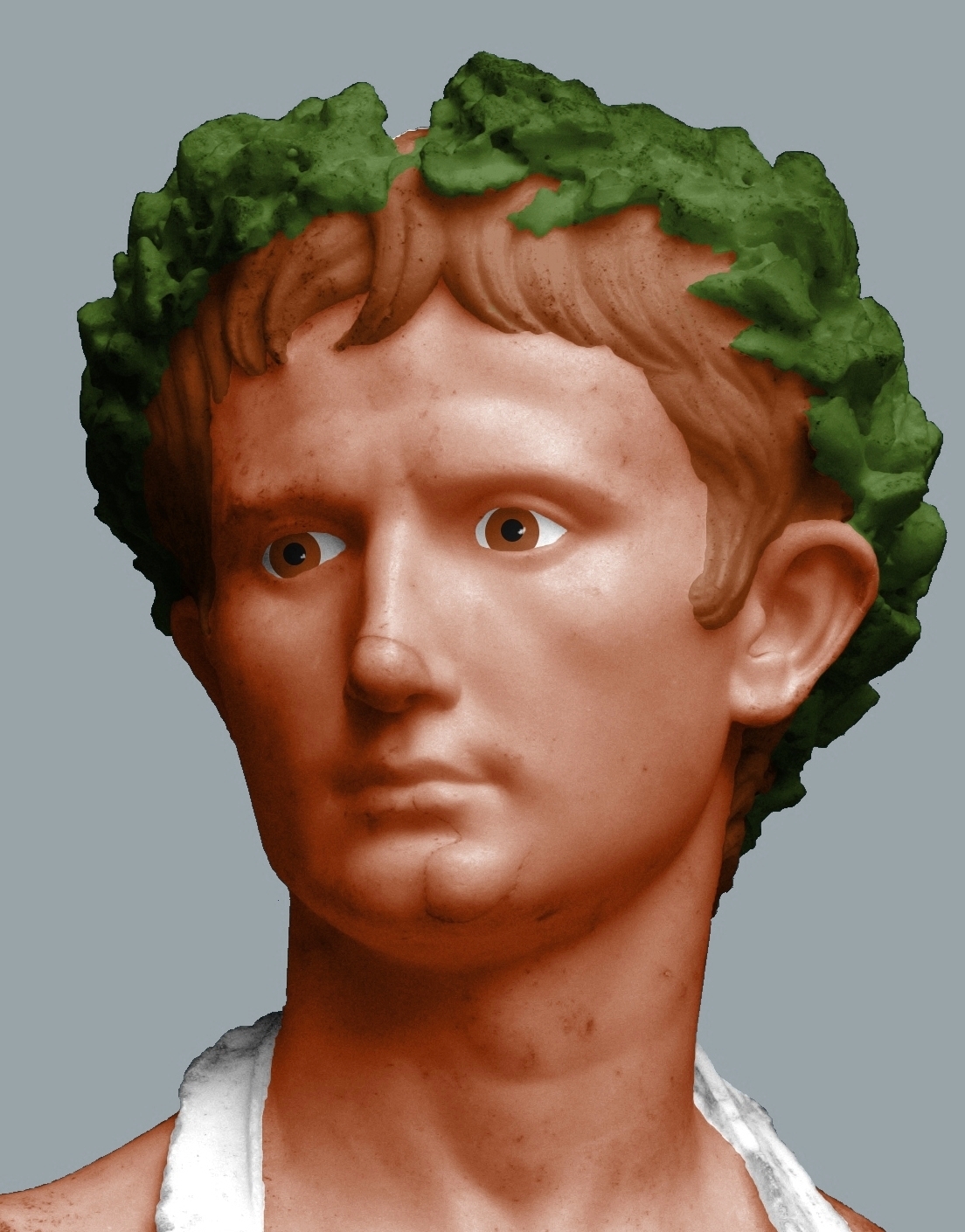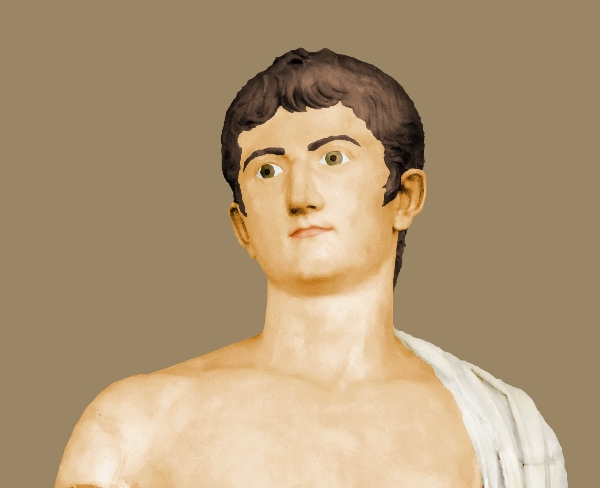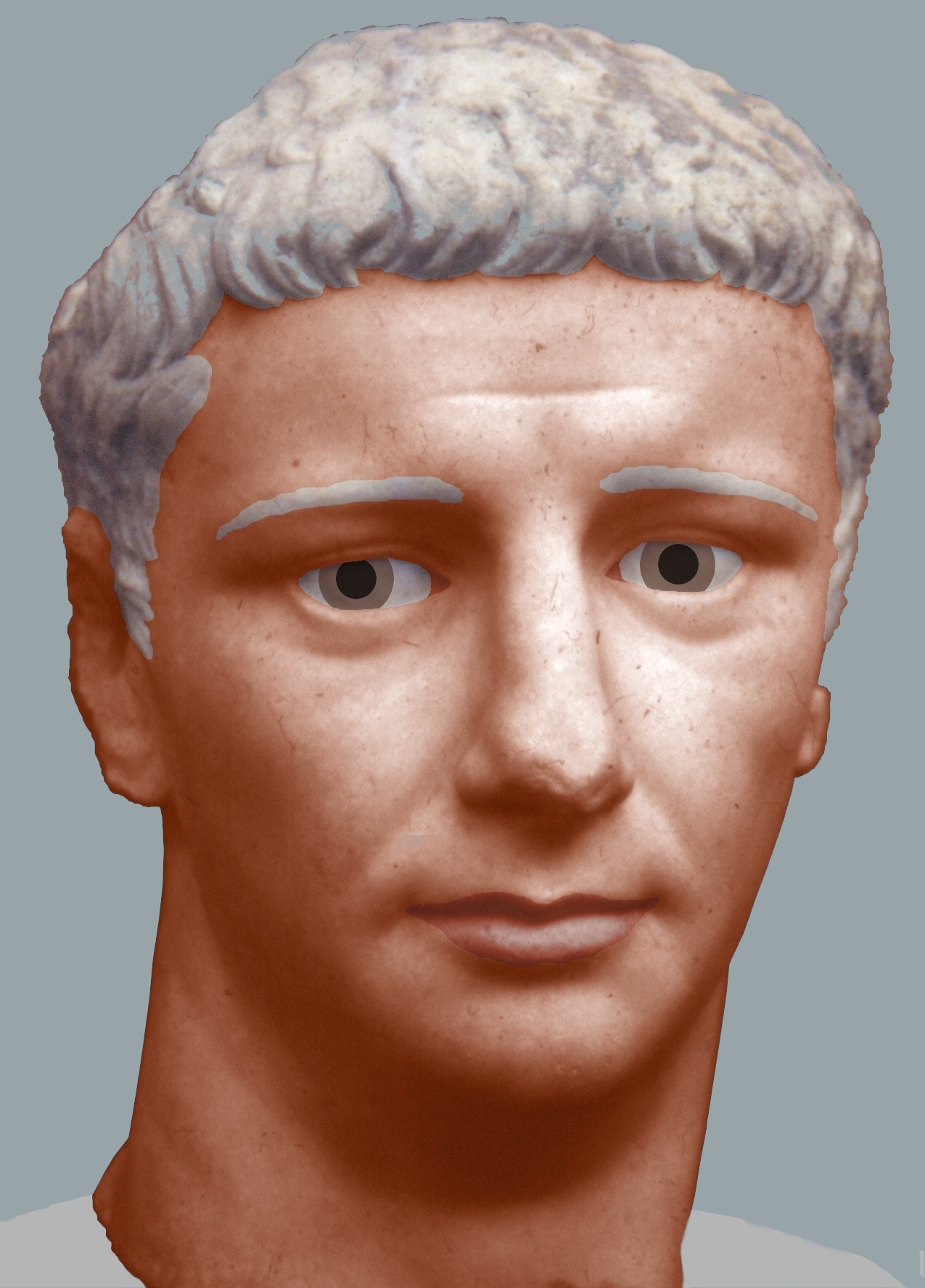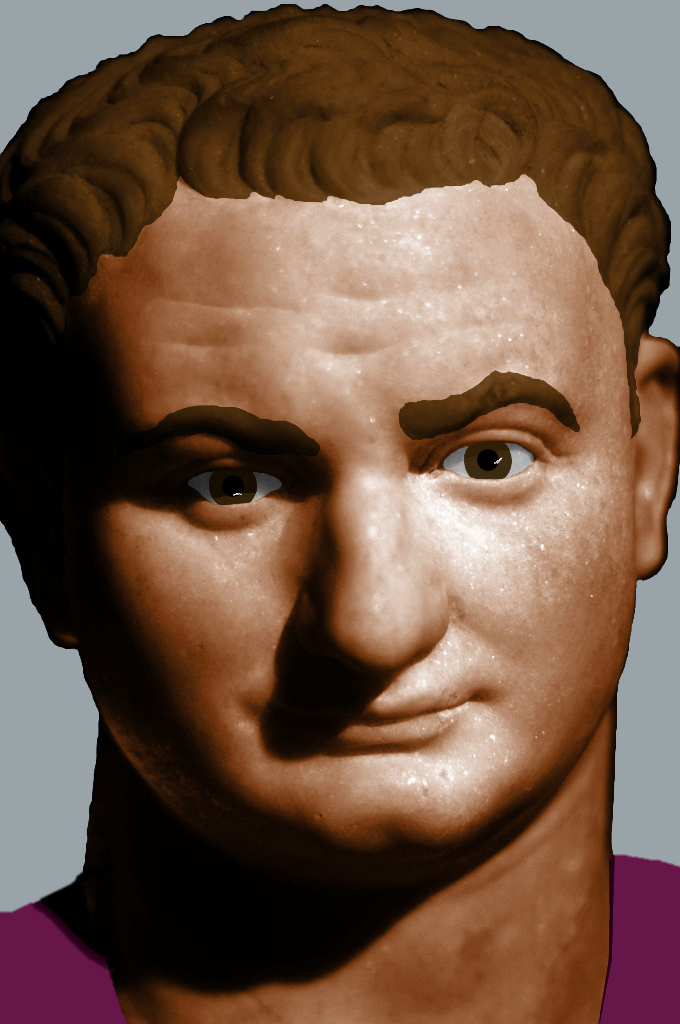ROMAE et AVGVSTO:
to ROME and AUGUSTUS
Rome · Julius · Augustus · Germanicus · Claudius · Britannicus · Vespasian · Titus · Nerva · Divine House · Trajan · Hadrian · Antinoüs · Antoninus · Verus · Marcus · Pertinax · Postumus · Probus · Julian
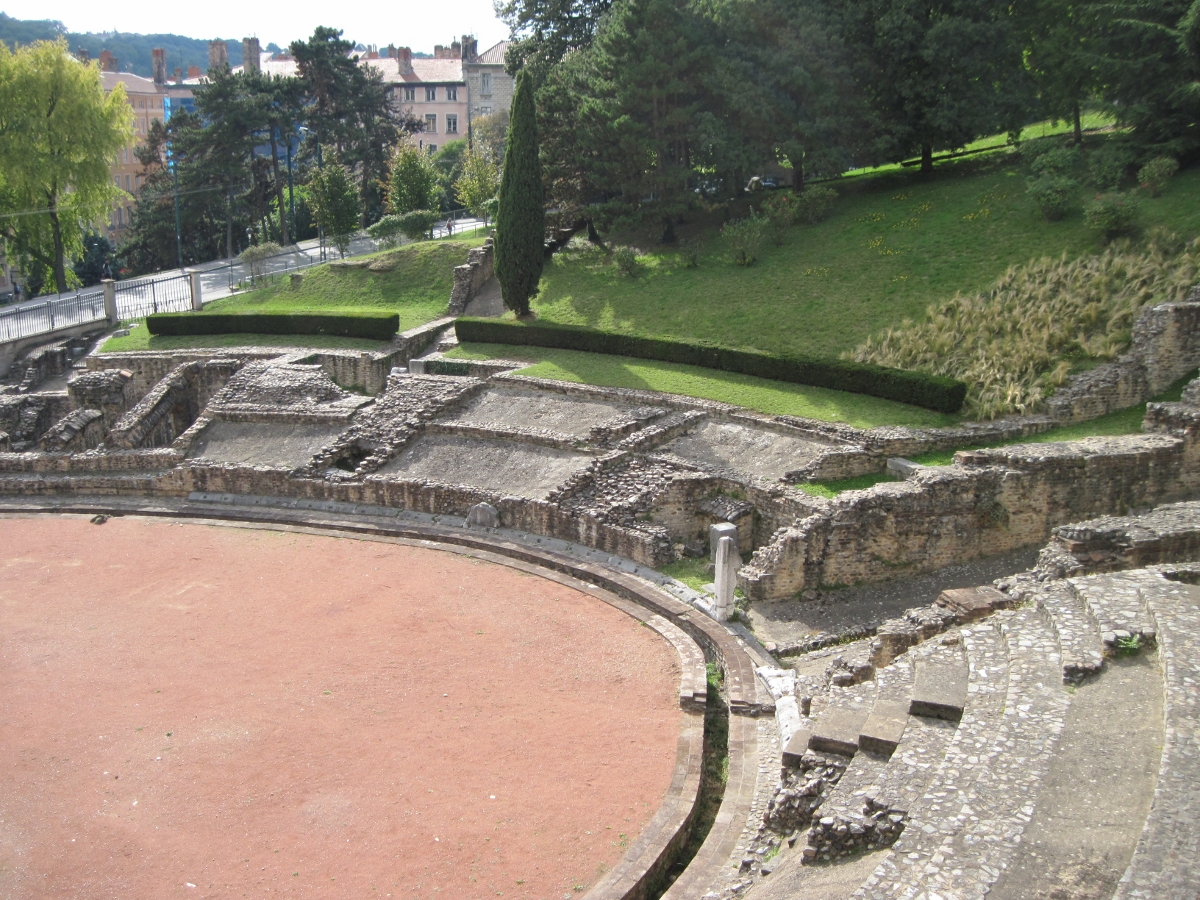
The amphitheatre of Lyon at Condate, within the complex of the Federal Sanctuary of Gaul.
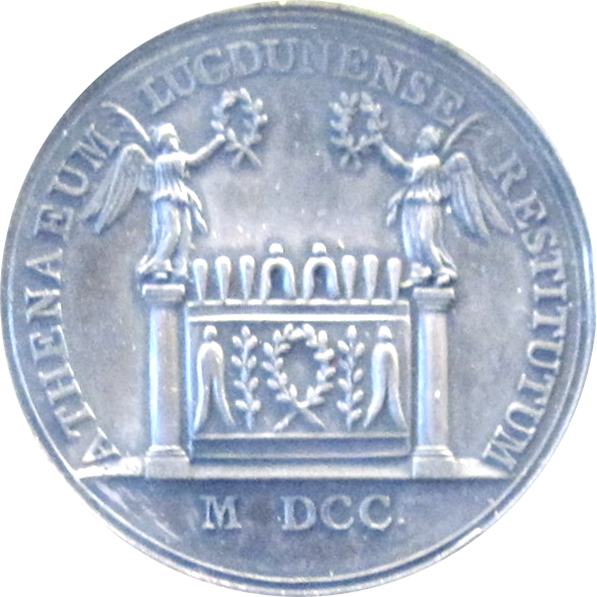
The altar of Rome and Augustus, represented on a medallion struck at Lyon in 1700.
(Musée des Beaux-Arts, Lyon)
Each year, the leading citizens of the Three Gauls (Belgica, Lugdunensis and Aquitania) would assemble at Condate, just upriver from Lugdunum, to discuss their affairs, elect from among their number a priest for the year to come, and offer pious vows and sacrifices to Rome and Augustus on the 1st of August. This was the holiest day in the Gallo-Roman calender, celebrated by a group of men who personified Gallic national unity more than any others. Yet the whole was frankly and openly dedicated to the city of the conquerors and the prince that ran it. Why?
The Feast of the Three Gauls has been claimed to be no more than a wily ruse, a mask to disguise the perpetuation of a Celtic festival. This is wishful thinking. The truth is that the Gauls were ready and able to adapt to their Roman reality. They venerated the guarantors of a new order that brought them peace, prosperity and high culture. Julius Cæsar defeated them: well and good. There is no shame in being conquered by a god. There is all the more glory if one’s own country is the place where the god was revealed. Gallic patriots who rebelled against the Roman status quo during the Year of the Four Emperors (69 of the Common Era, 822 of Rome’s) boasted of their descent from the bastards or collaborators of Julius Cæsar. Even people with no official position, no occasion to flatter the powerful, did not omit to invoke the house or the numina of the emperors in their prayers.
Before the Roman conquest, Celtic Gaul was already becoming steadily urbanized. It was bound by strong economic and cultural ties to the Mediterranean world. If Gaulish civilization was animated by its own genius, it is equally true that many of its own projects came to fruition under the Roman ægis. Roman roads made possible a commercial revolution. Peace among the Gaulish peoples enabled unprecedented prosperity and demographic growth. Even the Roman army provided an outlet for the Gaulish aristocracy to carry on its military tradition, while creating a ready market for the products of Gaulish fields and workshops. Many of the dreams of Celtic Gaul were realized by Roman Gaul.
Though some Gauls no doubt deplored their lost independence, both the masses and the élite had still greater reason to applaud their belonging to the greatest empire in the known world. It was easy to find reasons to reconcile oneself with Rome. Julius Cæsar, who had received the sword of Vercingetorix, thereby became his successor, and Cæsar Augustus his in turn. Gaul remained for long a favoured fief of the Julio-Claudian house. Those who read Virgil, Horace and Ovid—which is to say everybody with the least education—knew the special favour that the gods had conferred on Rome. That city was to unite the world, to make peace and civilization universal, and to enjoy an empire to which time set no limit.
The successive princes—distant, august and all but omnipotent—so strongly resembled gods on earth that one did not blush to pray to them during their lifetimes. On leaving this world, they were often proclaimed to be bona fide heavenly gods. All people have their own genii—their own protective spirits—and the divine influence that they exert is called their numen. Even the most scrupulous Roman citizen, knowing that longstanding custom forebade a living mortal from becoming an object of worship, had to admit that it was fitting to offer a cult to the numen of Augustus, that mortal favoured by the gods who safeguarded the well-being of the entire State. As for a postumously divinized emperor, there could be nothing more pious than to worship him.
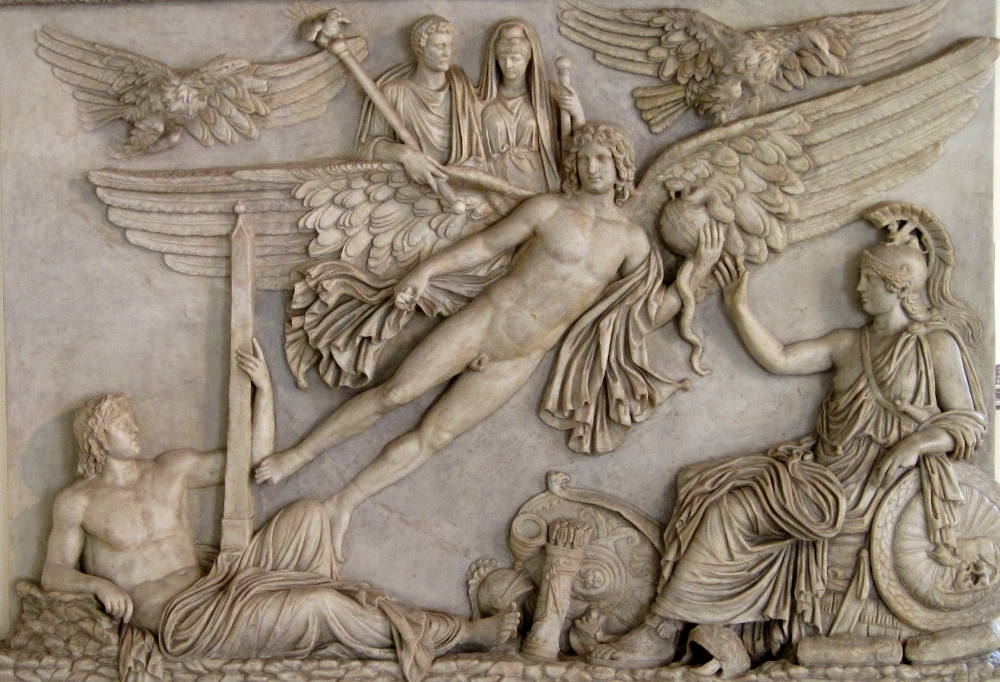
Allegorical depiction of the apotheosis of the divine Antoninus and Faustina, borne heavenward by a winged genius (accompanied by two eagles) under the benevolent eyes of the goddess Rome and the genius of the Field of Mars.
(Römisch-Germanisches Zentralmuseum, Mainz)
Apotheosis is the key concept in the divinization of a departed emperor (or sometimes of his relatives). The notion that the souls of mortals can be translated into heaven is old indeed. Hercules lived an earthly life before the mortal portion of his being was consumed and the divine portion welcomed on Olympus as a god. In the Greek world, worship was offered to the heroized souls of Achilles, Pythagoras, Socrates, Plato, Alexander the Great, Eumenes II and many others.
Apotheosis consists in the translation of a soul (which is divine to start with) to the celestial domain. It is represented in art by the ascension of the departed on the back of an eagle (cf. Ganymede’s ascension with Jupiter). Conceived in such terms, apotheosis is an occurrence that involves only supernatural beings (which does not prevent the fact from being revealed to mortals, as in the case of Julius Cæsar’s comet). It falls to mortals, however, to inaugurate and administer cults, and this is why the Senate had its role in officializing the worship offered to divinized princes. Their apotheosis could owe nothing to the act of the Senate, but their official cult depended upon it.
The Senate authorized the postumous cult of a number of members of the imperial house, whose names thenceforth were prefixed with the title díuus or díua (‘the divine’, respectively masculine and feminine), starting with the divine Julius, i.e. Julius Cæsar (see the summary list for a more complete list).
Many invocations were offered in honour of the divine house, in h(onorem) d(omus) d(iuinae). The divine house is, naturally, that of the emperor; the formula in h. d. d. became current in the 2nd century ce, while Nerva, Trajan, Plotina, Marciana, Matidia, Hadrian, Sabina, Antoninus, Faustina and Marcus Aurelius were supplying within a single family as many examples of imperial genius, splendour and wisdom.
Below, and on the two following pages (next, last), are brief descriptions of several deities whose earthly services to Gaul warrant mention.
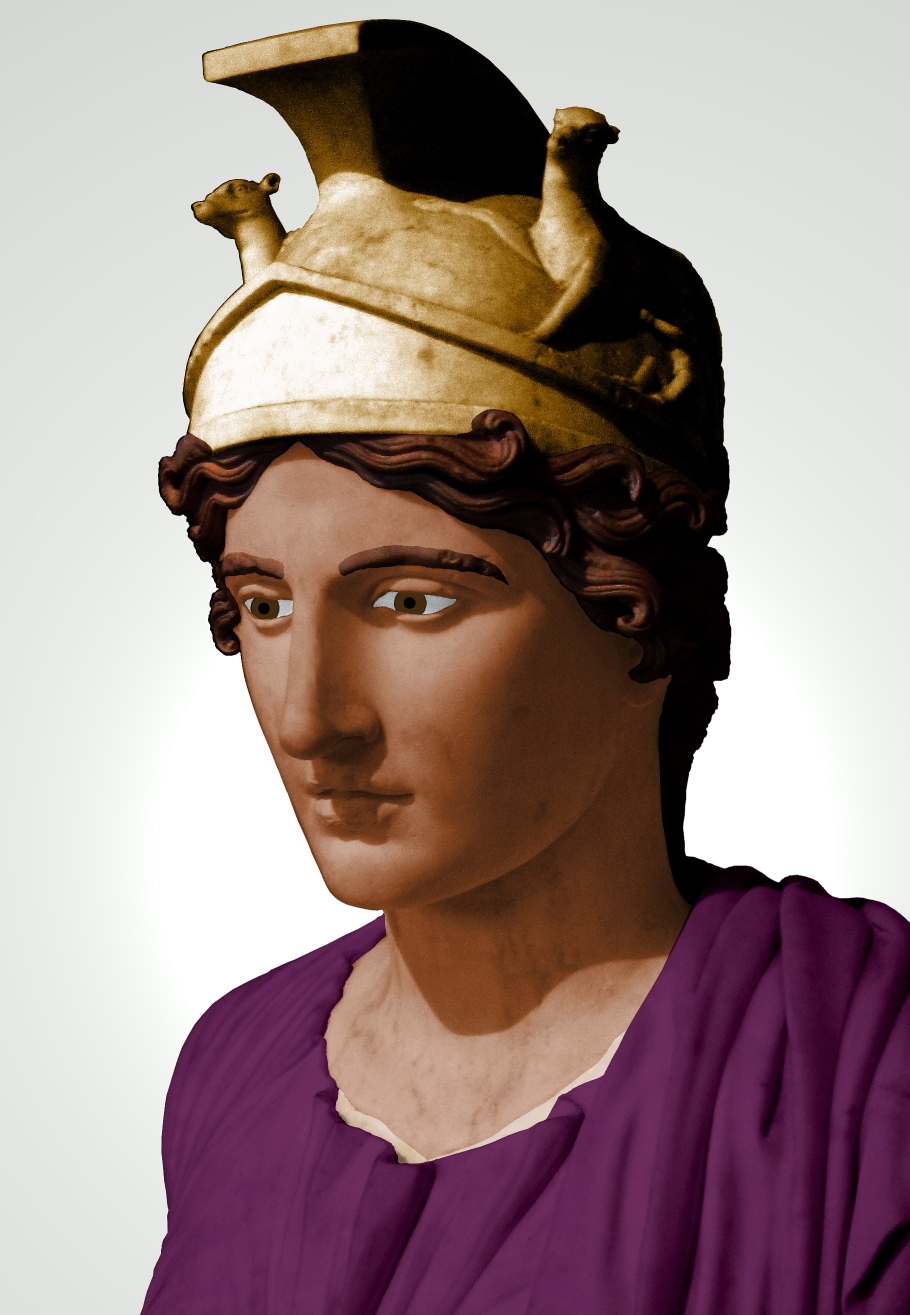
The goddess Rome (colourized photograph of an ancient bust).
(Musée du Louvre)
The Goddess Rome
The whole world is full of gods, and every place has its own tutelary spirit. No less than mountains, rivers and seas, cities stand under the protection of deities that watch over their undertakings. That of Rome—the dea Roma or goddess Rome—has worked marvels. To unite the whole Mediterranean world is to institute, across vast distances, one system of laws, one common langauge, one scholarly and artistic tradition, one commonwealth, standards of weights and measures, and one integrated economy. The Roman heritage today is inescapable today from Turkey to Portugal and from Scotland to Libya. Today’s speakers of Romance languages from Romania to Patagonia, speak in a tongue derived from regional Latin dialects, including that of Gaul. It is no exaggeration to say that the study of Antiquity laid the foundation for all our science, philosophical currents and fine arts. The works of the goddess Rome remain everywhere to be seen.Concerning the Rome of myth, the chief primary sources are naturally Livy’s Roman History and Virgil’s Æneid. Greg Woolf contributes an especially pertinent analysis in Becoming Roman: The origins of provincial civilization in Gaul (1998). The works of the goddess Rome can be traced everywhere from Palladio’s architecture to the writings of Voltaire, the sculpture of Canova and far beyond.
Feast day: 1 August (celebrated along with the divine Augustus at Condate, today’s hill of La Croix-Rousse in Lyon, by the delegates of the Three Gauls)
Birthday: 21 April
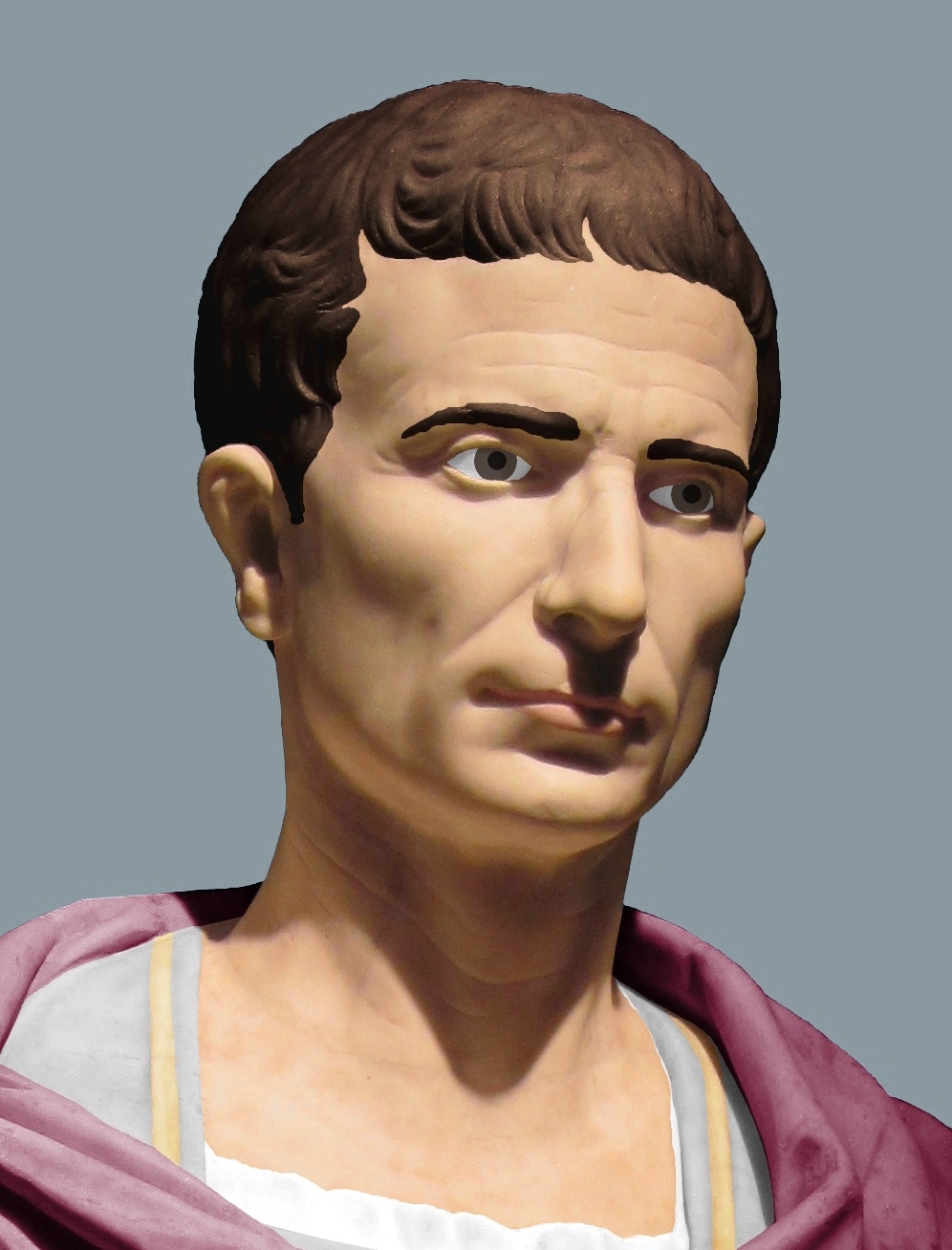
The divine Julius.
(Gallo-Romeins Museum, Tongeren)
The Divine Julius
Dictatorship: 48–44 bce (consul in 59, proconsul in Gaul from 58 to 49 bce)
The conqueror did not solely serve his own interests in Gaul.Historians can take advantage of Cæsar’s own writings (including The Gallic Wars and The Civil War), as well as those of Cicero, Cassius Dio, Suetonius, Plutarch, etc. He burned, he pillaged, he killed: all this is true. But he also pardoned his former enemies, while his army’s passage and the colonization of his veterans militated in favour of the commerce and urban development of the interior of Gaul. It was no less his deeds than those of Vercingetorix that unified the Gaulish peoples who had until then been at one another’s throats. Arrived at the height of his power, he did not hesitate to have Gaulish notables admitted into the Roman Senate. Suetonius preserves the following verses, used by Julius Cæsar’s opponents to mock his supposed favouritism for the Gauls:
Gallos Caesar in triumphum ducit, idem in curiam;
Galli bracas deposuerunt, latum clauum sumpserunt.
“Cæsar led the Gauls in his triumph and into the Chamber;
the Gauls set aside their britches for the senatorial toga.”C. Svetonivs Tranqvillvs, Vita diui Iuli 80.
Thanks to the actions of the divine Julius and his successors, Gaul remained largely a loyal fief of the Julio-Claudian house for as long as that house existed.
The cult of the divine Julius is closely linked with that of his comet, the symbol of his apotheosis.
“This spoke, the Goddess to the senate flew;
Where, her fair form conceal’d from mortal view,
Her Cæsar’s heav’nly part she made her care,
Nor left the recent soul to waste to air;
But bore it upwards to its native skies:
Glowing with new-born fires she saw it rise;
Forth springing from her bosom up it flew,
And kindling, as it soar’d, a comet grew:
Above the lunar sphere it took its flight,
And shot behind it a long trail of light.” P. Ovidivs Naso, Metamorphoseon XV.843-851, translated from the Latin by Sir Samuel Garth, John Dryden and others. In the original:Vix ea fatus erat, media cum sede senatus
constitit alma Venus, nulli cernenda, suique
Caesaris eripuit membris neque in aera solui
passa recentem animam caelestibus intulit astris.
Dumque tulit, lumen capere atque ignescere sensit
emisitque sinu: luna uolat altius illa,
flammiferumque trahens spatioso limite crinem
stella micat natique uidens bene facta fatetur
esse suis maiora et uinci gaudet ab illo.
Feast day: 18 AugustThe Temple of the Divine Julius’ Comet was inaugurated on 18 August, 29 bce.
Birthday: 12 July
The Divine Augustus
Principate: 28 bce–14 ce (triumvir starting in 43 bce)
Civil and social wars had ravaged the commonwealth for sixty-one years when the forces of Cæsar Augustus took Alexandria in 30 bce. The leadership of Augustus favoured peace and unity through the loyalty he inspired among his supporters (notably including Agrippa, that peerless general and administrator), and also thanks to his ability to reconcile opponents (once in Sicily, a rebel army defeated that of Augustus but gave him the victory, as the victors chose to rally to his side). During the Triumvirate, Mark Antony had insisted on including Cicero’s name among those destined for execution. Under Augustus, it was Cicero’s son—then serving as consul—who read out to the Senate the news of Antony and Cleopatra’s suicides. qui lit au sénat la nouvelle des suicides de Marc-Antoine et de Cléopatre. Augustus would later raise Antony’s daughters in his own home.
The reorganization of the republic undertaken by Augustus in 27 bce put an end to the constant instability that had been frustrating the peaceful development of the empire. Augustus surrounded himself by people of genius. Within his own family were to be found Livia, Marcellus, Agrippa, Drusus (and a Tiberius whose depravity was not to fully reveal itself before 26 ce). Augustus presided over a cultural flowering unprecedented in Rome, whether by his own patronage or through that of his excellent minister, Mæcenas. The works of the Latin writers of that age (including such poets as Virgil, Horace, Ovid, Tibullus, Propertius and Gallus; historians like Livy and Sallust; the biographer Cornelius Nepos; or the didactic writers Vitruvius and Hyginus) bear witness to the discriminating taste and productive brilliance of the era.
Augustus was active in Gaul. Like his adoptive father, Cæsar Augustus considered Gaul a loyal domain worth taking care of. The financial reforms that he instituted, in Gaul as in Sicily, ended the arbitrary exactions of the tax farmers. Augustus spent three years in Hispania and Gaul (16 to 13 bce), during which he organized the provinces of Gallia Aquitania, Gallia Lugdunensis and Gallia Belgica (hitherto the enormous and rather anarchic Gallia Comata, or ‘long-haired Gaul’). Governor Plancus established Lugdunum (Lyon) as a Roman colony; a new road network drawn up by Agrippa made it the transportation centre of Gallia Comata. One of Augustus’ chief foreign victories—the conquest of the Alps—favoured commercial links still more, and put an end to the transshipment duties imposed by the Alpine tribes.The works of Suetonius and Cassius Dio are good sources here. The divine Augustus left us a kind of short political autobiography (Res gestae diui Augusti), while his contemporaries, including Ovid, Virgil Horace and others, preserve his memory in their several ways.
Quod bonum faustumque sit tibi domuique tuae, Caesar Auguste ! Sic enim nos perpetuam felicitatem rei publicae et laeta huic precari existimamus: senatus te consentiens cum populo Romano consalutat patriae patrem.
“Good fortune and divine favour attend thee and thy house, Caesar Augustus; for thus we feel that we are praying for lasting prosperity for our country and happiness for our city. The senate in accord with the people of Rome hails thee Father of thy Country.”Salutation offerte au divin Auguste par Valère Messala. C. Svetonivs Tranqvillvs, Vita diui Augusti 58.
Feast day: 1 August (celebrated along with the divine Augustus at Condate, today’s hill of La Croix-Rousse in Lyon, by the delegates of the Three Gauls)
Birthday: 23 September (celebrated for example at Narbo with a three-day festival)
Germanicus
Although it was Tiberius and Gaius who succeeded Augustus, this was not because men of genius and virtue were lacking at that time, even within the imperial family. Agrippa, Marcellus, Lucius and Gaius Cæsar perished before their adoptive father Augustus, and Drusus and Germanicus during the reign of Tiberius.
Of these men, Germanicus was the one whose loss was most bitterly regretted by the people, the army and even the Senate of Rome. Germanicus’ heroic life, virtuous conduct and premature death excited sympathy everywhere. He was the son of Drusus, the nephew of Tiberius (who became his adoptive father), and in his own right a successful general. In 16 ce, he defeated the Germanic warlord Arminius. He was also the author of a didactic poem on astrology, a free Latin translation of the Phenomena of Aratus. He was poisoned, as it was said, on the orders of his adoptive father, who was jealous of his victories and of the adoration accorded him by the public and the legions. His enduring popularity eased the way for Germanicus’ son Gaius (called Caligula) to succeed to the purple—rather a shameful legacy to leave to the state—but on the other hand it also favoured the succession of his younger son Claudius.Tacitus’ words in favour of Germanicus in the Annals are strongly evocative. Other information on him can be found in Suetonius (such as in the Vita Gai concerning his son or in the Vita Claudi concerning his brother) and in Cassius Dio. We have already mentioned Germanicus’ surviving astrological work, the Aratea.
While the State never officially divinized him, he amply warrants the honours of a hero. Indeed, his birthday was still being celebrated by the soldiery in the 3rd century, as the Feriale duranum shows.Feriale Duranum.
Birthday: 24 May
The Divine Claudius
Principate: 41–54 ce
This native of Lugdunum (Lyon), so admirably portrayed by Derek Jacobi in the series I, Claudius, survived the murderous careers of the emperors Tiberius and Gaius (Caligula). His great prudence and scholarly habits (he was a historian by profession) did not prevent him from directing the conquest of Great Britain—an enterprise in which many Gauls took part, and which was greatly to the benefit of Gallic commerce. Claudius’ administration was generally a judicious one, despite the jealousy that the Senators felt for his agents (who were mainly freedmen). Thanks to his medical condition—probably cerebral palsy—he stuttered and limped. He was cuckolded several times by his wives (of whom he had four in succession). For these reasons, the Senators regarded him with derision.For this reason, our historians (drawn from the Senatorial class) take a particularly hostile or belittling tone towards this prince. This includes Tacitus and Suetonius, as well as Seneca in the satirical Apocoloquintosis. By contrast, rank-and-file soldiers, the Roman plebs, and especially the Gauls made plain their sympathy for this gentle prince. The famous Claudian Tables, found at Lyon, commemorate a speech by Claudius before the Senate, in which the emperor recalled the Gauls’ merits and exhorted the Senators to allow Gaulish members to be admitted to their number.Ti. Clavdivs Caesar Avgvstvs Germanicvs (48 ce), Claudian Tables. This learnèd prince, a historian of the Etruscans, undertook a reform of the Latin alphabet that included the introduction of three new letters (the respective equivalents of w, short ü and the Greek ψ).Revilo P. Oliver (1949). “The Claudian Letter Ⱶ”, American Journal of Archaeology 53(3): 249–257.
Birthday: 1 August (the very day of the inaugural Federal Feast of the Three Gauls in Lyon)
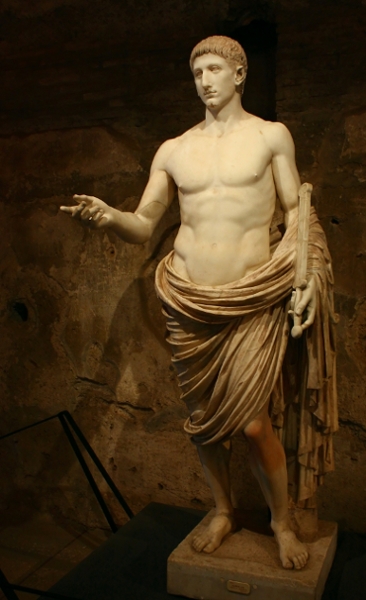
Statue said to be of Britannicus, found in a temple of the imperial cult in Pompeii.
(Modification of a photograph by Antoine Motte dit Falisse, licence CC-BY-SA)
Britannicus
Here too, destiny gravely cheated the Roman people by letting the worthless Nero rise to power at the expense of his step-brother Britannicus, the promising biological son of Claudius. In Britannicus was hailed the Spes augusta or Augustan Hope from his birth in 41, just a year after that of his excellent sister Octavia. Still, the virtue of Britannicus was barely put to the test, for he was murdered by Nero at the age of 14 (in the year 55). A similar fate awaited Octavia, whom Nero compelled to commit suicide in 62.
His genius lived again for awhile under Titus, who had been one of Britannicus’ childhood companions. Titus took advantage of his principate to dignify Britannicus’ memory, raising a number of statues to him. Centuries later, this tragic life was to inspire the play Britannicus by Racine.Our main primary sources are Tacitus’ Annals, Suetonius’ Lives (particularly that of Nero) and Cassius Dio.
We should note that Britannicus was never divinized. If outraged innocence can merit a hero’s honours, let us not quibble to offer them to Britannicus.
Birthday: 12 February
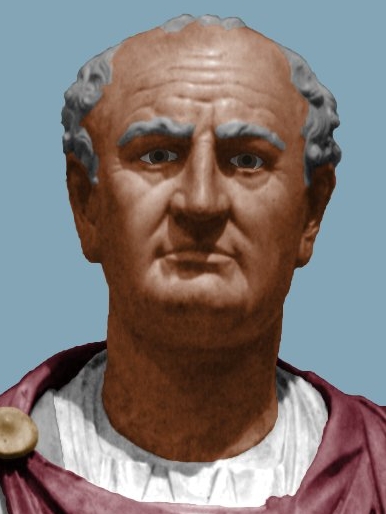
The divine Vespasian.
(Modification of a photograph by the Wikipedia user Shakko, licensed CC BY-SA)
The Divine Vespasian
Principate: 69–79
Vespasian first distinguished himself by his military victories in Great Britain and Judæa. He was a sober, honest and prudent man, but also one of good humour and modest tastes. Vespasian’s greatest success was to reunite the empire after the chaos and internal wars that followed the revolt of Vitellius and the suicide of Nero. These conflicts were at their bloodiest in Gaul, where the inhabitants of Lyon and Vienne, for example, attacked each other, the Ædui found themselves enemies of the Lingones, and so on. The reestablishment of calm and good governance had the most salutary consequences for Gaul and the empire as a whole. The return of peace and prosperity confirmed the Gauls in their choice to abandon Civilis’ war effort for Gaulish independence. From this point on, the Gauls were to affirm themselves within the empire with confidence. Their arts and crafts would elaborate a distinctive regional style; gone were the days of apishly copying Italian models. Vespasian promoted education and advanced the careers of such luminaries as Tacitus, Quintilian, Flaccus and Josephus. The establishment of the Flavian house—the first succhessful dynasty after the Julio-Claudians—also demonstrated that the extinction of the latter house need not be understood as a catastrophe for the State.Vespasian was the patron of both Josephus and Tacitus; the works of both therefore include much information on this remarkable man. Suetonius wrote a Life of him, while Cassius Dio’s history stretches to this period as well.
Birthday: 17 November
The Divine Titus
Principate: 79–81
Not for nothing does Suetonius call him amor ac deliciae generis humani, “the love and delight of the human race”.C. Svetonivs Tranqvillvs, Vita diui Titi 1. Titus is among those díuí (like Nerva, Pertinax and Julian) whose principate did not last long, but who left an indelible impression on posterity. He was above all a capable military commander, whose most noteworthy accomplishment aws the conquest of Jerusalem (the destruction and collective suicide of whose inhabitants he tried to prevent). Before his succesion, he had had a certain reputation for debauchery. On succeeding his father Vespasian, Titus showed an unexpected modesty and concern for justice. He cast off a well-loved mistress, the Jewish queen Berenice, to conform to his fellow citizens’ expectations (no doubt fearing echoes of Cleopatra).The two rival French playwrights, Racine and Corneille, each wrote a tragedy on the subject (respectively Bérénice and Tite et Bérénice), which débuted at nearly the same time. Racine is generally conceded to have won the dramaturgical duel, though both were accounted successes. Three disasters rocked the empire during his principate: the eruption of Vesuvius (resulting in the total destruction of Pompeii), a devastating fire in Rome (coming so soon after those of the times of Nero and of the war between Otho and Vitellius), and a deadly plague. In the midst of these tragic events, Titus won distinction for his active response and his generosity towards the afflicted. Less than three years after his succession, Titus joined the ranks of the immortals. He was succeeded by a brother, Domitian, whom he had loved with no return, and who would soon make plain the brutality of his own character.Besides Suetonius, Tacitus (Histories) and Josephus furnish details on the short life of this estimable prince.
Birthday: 30 December
Notes
In addition to the sources cited below, I have made use of several secondary sources, particularly Richard D. Weigel’s site De Imperatoribus Romanis and the English and French editions of Wikipedia.

En français svp !

Auf deutsch, bitte!
